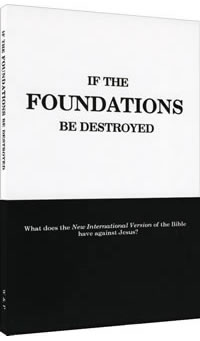Mainline Churches Use Defective Bibles to Approve Sin
One after another, the "mainline" churches are ignoring the Bible to follow politically correct paths that the Bible calls sin. The Episcopal church is experiencing a major split over the installation of a practicing homosexual bishop. Individual congregations are forced to decide whether to obey the Bible or follow the denominational leaders.
This August, the Evangelical Lutheran Church in America (ELCA) also voted to lift a ban on homosexual clergy. Already, ELCA congregations are forming another denominational alliance claiming that the ELCA has "departed from the teaching of the Bible as understood by Christians for 2,000 years."
One reader of an internet article on this vote observed that the root of this controversy began in the 1970s. Branches of the Lutherans in the U.S. took two different views of the Bible. One, led by the Missouri Synod, took the position that the whole Bible is the word of God.
The others proposed that the Bible only "contained the word of God." The reader notes, "If the Bible only contains the Word of God, you can pick and choose what is of God and what is of men."
This "picking and choosing" began a long time before 1970, according the author and linguist, David W. Daniels. He has written extensively of another time when proud men made arbitrary decisions as to what should be in the Bible.
His book, Did the Catholic Church Give us the Bible?, gives a detailed history of one stream of manuscripts that contains thousands of examples of this "picking and choosing" by men. He describes how early copies of scripture arrived in Alexandria, Egypt to be studied by world-class "scholars" of that time. Because they did not believe Jesus was God and were infected with Greek philosophy, they began altering the text to fit their disbelief.
Those polluted manuscripts were the ones picked up by Westcott and Hort as the foundation Greek for the modern Bible versions. Since then, the "translators" of these modern versions took the same liberties based on the "pick and choose" philosophy that the Bible only contains the word of God. This has produced several dozen versions today, which omit and change hundreds of verses. They disagree among themselves and in some cases even contradict each other.
Daniels traces another stream of manuscripts that flowed from the original apostles in Jerusalem up through Antioch. Copies were preserved in Europe during the dark ages, sometimes in caves to avoid destruction. Ultimately, these faithful copies were used by the Reformers to give us God's preserved words in English, the King James Bible.
In another book called Look What's Missing, Daniels examines 40 of the most popular modern versions to show that they are missing hundreds of words, phrases and whole verses that were preserved for us in the King James Bible.
It is understandable that these denominations have lost their way when they are reading Bibles that are so corrupted that they do not believe that they have God's word. No wonder they "pick and choose" verses that support what they want to believe, rather than trusting the Bible for what it says.
We have a classic example of this confusion when dealing with homosexuals. In some cases where the KJV uses the clear word "sodomites," the modern versions read "temple prostitutes."
Homosexuals look at this and say, "We are not temple prostitutes, so the Bible is not talking about us." No wonder there is such confusion in these denominations when they are relying on these defective Bibles.
- See more articles on related topics:
- Bible Versions
- Bible Translation
- Westcott and Hort
- Two Types of Bible Versions
- History of Preservation
Other Articles from November/December 2009:
- Pope Pressured to Reveal Names of 'Lost Jews'
- If Jesus Lied, Can He be God?
- 240,000 Gospel 'Seeds' Planted in Zimbabwe: Harvest Ripe
- God Weighs in on Pro-Homosexual Vote?
- New Discoveries Continue to Shake the Evolutionist's World
- "Why Did You Put My Story in this Tract?"
- New Spanish Bible Corrects Alexandrian Pollution
- A Message From Jack Chick - Nov 2009
- Chick Mail Bag Nov-2009
- Tract Passing Tips - November 2009
More on Bible Versions:
Products of Interest:
-

Look What's Missing!
256 pages
For years, publishers have been removing words, and even whole verses, from modern Bibles. What's missing from your Bible? Take a look! -

Did the Catholic Church Give Us the Bible?
208 pages
The Bible has two histories. One is of God preserving His words through His people. The other is of the devil using Roman Catholic "scholars" to pervert God’s words and give us corrupt modern Bibles. -

If The Foundations Be Destroyed
98 pages
What does the NIV have against Jesus? Is your Bible missing important verses and doctrines? If it is an New International Version there's a lot missing!



